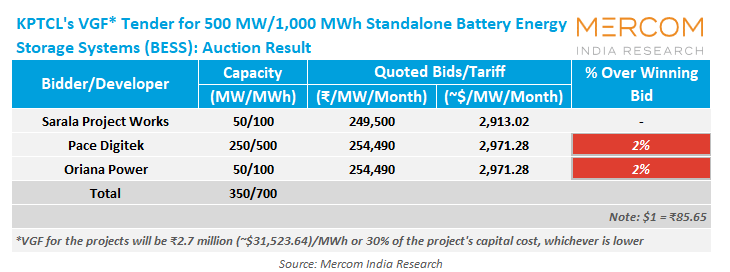Sarala, Oriana and Pace win KPTCL’s 1 GWh Standalone BESS Auction
KPTCL issued the tender in February this year
April 3, 2025
Follow Mercom India on WhatsApp for exclusive updates on clean energy news and insights
Sarala Project Works, Oriana Power, and Pace Digitek are winners in Karnataka Power Transmission Corporation’s (KPTCL) auction to set up 500 MW/1,000 MWh grid-connected standalone battery energy storage systems (BESS) to manage peak power demand.
Sarala won 50 MW at a tariff of ₹249,500 (~$2,913.02)/MW/month. Oriana quoted a tariff of ₹254,490 (~$2,971.28)/MW/month to win 50 MW. Pace won 250 MW, also at a tariff of ₹254,490 (~$2,971.28)/MW/month.
The unsuccessful bidders were NTPC Green and JSW Neo, who quoted tariffs of 16.63% and 23.85% over the lowest tariff.
Of the total auctioned capacity, only 700 MWh capacity was awarded. KPTCL will likely explore ways to allot the remaining capacity.
KPTCL issued the tender in February this year.
Successful bidders can avail viability gap funding (VGF) of ₹2.7 million (~$32,114)/MWh or 30% of the project’s capital cost, whichever is lower.
The total project capacity must be situated near substations within Karnataka’s state transmission utility network, with land identification and allocation falling under KPTCL’s scope.
The selected BESS developers will establish, operate, and maintain the BESS. The primary goal is to ensure that the energy storage facility is available to the State Load Despatch Centre (SLDC) on behalf of the state’s Electricity Supply Companies (ESCOMs) for charging and discharging as required.
The developers must ensure that the BESS operates for two cycles per day. The system can be charged from any energy source, including conventional ones. The SLDC will manage the scheduling of charging and discharging on behalf of the state ESCOMs, which will also supply the necessary power for charging, considering the minimum system efficiency.
Recently, the Ministry of Power directed all states and implementing agencies to award all BESS contracts by June 2025, enabling the VGF program to be completed by May 2027. Due to a decline in BESS prices in the recent past, a higher BESS capacity of 13,200 MWh, up from 4,000 MWh, is envisaged as part of the VGF program.
India’s total BESS capacity reached 219.1 MWh as of March 2024, according to Mercom India Research’s newly released report, India’s Energy Storage Landscape.
According to the report, 1.6 GWh (~1 GW) of standalone BESS, 9.7 GW of renewable energy projects with energy storage, and 78.1 GW of pumped hydro projects were in various stages of development (60 GW under survey and investigation, and 18.1 GW under development) as of March 2024.

